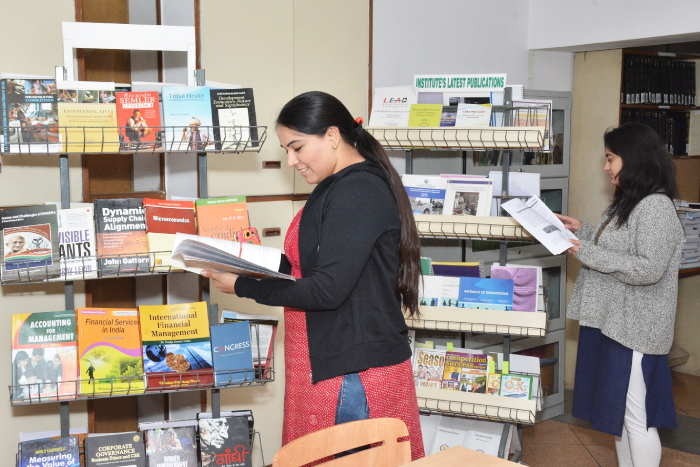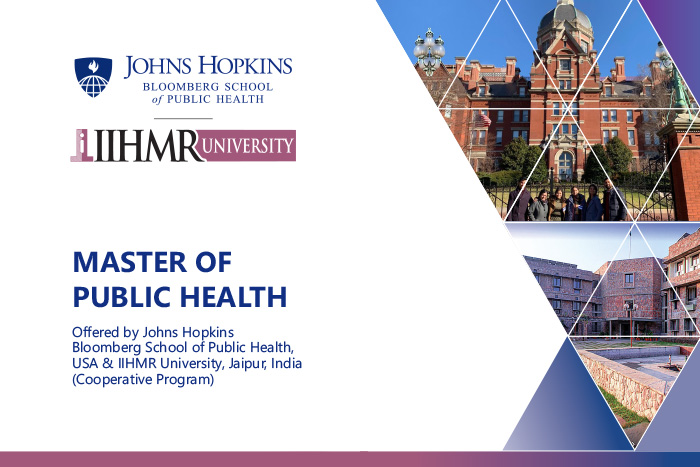FAQ
CATEGORY 1: About the Program
The curriculum includes:
• The program is an 80+ credit curriculum delivered through 35+ courses, combining foundational knowledge of core courses interspersed with leadership training, hands-on practice, and global exposure.
- Foundations (Core Courses): Epidemiology, Biostatistics, Health Systems, Public Health Biology, Environmental Health, and Social & Behavioural Sciences.
- Leadership & Management: Modules in Leadership, Negotiation, and Strategic Management to build practice-oriented decision and team skills.
- Applied Learning: A Capstone Project and an intensive field Practicum that synthesize classroom learning with real-world public-health problem-solving.
- Global Exposure: Summer Institute coursework at Johns Hopkins University, Baltimore.
Note: Course titles and sequencing follow the approved academic plan; minor updates may occur to reflect current public-health priorities.
Applicants need to have completed :
- a prior college-level mathematics course,
- one introductory general biology course, and
- one health-related science course (e.g., Microbiology, Nutrition, or Anatomy and Physiology) OR a second college-level biology course.
The program follows a dynamic hybrid delivery format, combining in-person, online, and field-based learning experiences:
- On-campus instruction occurs at IIHMR University, Jaipur, where students participate in face-to-face courses taught by faculty through lectures, interactive groupwork, quizzes, and seminars.
- Faculty from Johns Hopkins University engage with students online through live interactive sessions, asynchronous content and group discussions.
- A Summer Institute at Johns Hopkins University, Baltimore provides a short, intensive, in-person experience for global exposure and advanced skills.
This cooperative MPH program offers an exclusive and distinguished pathway for participants to earn a Master of Public Health (MPH) from Johns Hopkins University. Other key features of the program which make it stand out include:
- Hybrid, experiential design: A rigorous 80+ credit plan across 35+ courses, blending on-campus learning at IIHMR with BSPH-led online modules, case work, labs, simulations, and team projects to build real-world competence.
- Hopkins Summer Institute (included): In-person coursework at JHU, Baltimore is built into the program and covered within the program fee, adding global exposure and advanced skill-building. In the current academic session, the students will travel to Baltimore, Maryland, USA, to attend the Summer Institute at Johns Hopkins Bloomberg School of Public Health in June 2027.
- Field immersion & capstone: A supervised Field Practicum with partner organizations plus a Capstone Project—both faculty-mentored—ensure direct application of methods, management, and implementation science.
- Leadership readiness: Structured training in leadership, negotiation, and strategic management prepares graduates for roles as public-health practitioners and change leaders.
- Career-advancing networks: Access to IIHMR’s nationwide health-systems ecosystem and the Johns Hopkins alumni community (among the world’s largest in public health) opens pathways to opportunities at national and global levels.
CATEGORY 2: Admission Process
Applicants applying for this program must go through a pre-screening process and be pre-approved by IIHMR University. Last date for pre-screening is May 31, 2026. Please visit: https://applications.iihmr.edu.in/mph-application-form for the pre-screening process.
The pre-approved applicants must then process their application through SOPHAS, which is a centralised application service for schools and programs of public health in US.
SOPHAS (Schools of Public Health Application Service) is the centralized online application portal used by the Johns Hopkins Bloomberg School of Public Health (BSPH) and other U.S. schools of public health. In found eligible in prescreening the candidates are invited to apply on SOPHAS to proceed with the application process. SOPHAS registration carries an application fee of US $ 150. Please note that IIHMR University will reimburse the application fee for candidates who get admitted to the program.
Through SOPHAS, you will submit:
• Your application form, personal statement, and letters of recommendation.
• Upload official transcripts (if via WES credential evaluation). For ECE, course-by-course evaluations with transcripts must be sent directly to BSPH electronically at bsph.admissions@jhu.edu.
- Stage 1: Fill the IIHMRU Pre-Screening Form.
- Stage 2: Register, fill, and submit the SOPHAS application by July 1, 2026. Pending documents may be submitted until July 15, 2026.
Important Dates:
- Pre-Screening Deadline: May 31, 2026
- SOPHAS Application Deadline: July 1, 2026
- Document Upload Deadline on SOPHAS: July 15, 2026
- Program Commencement: October 2026
CATEGORY 3: Required Documents and Credentialing
- Credential Evaluations: Transcripts must be evaluated by World Education Services (WES) or Educational Credential Evaluators (ECE).
- Standardized Test Scores (GRE, GMAT, MCAT, LSAT) – Optional
- English Proficiency Test Scores (Less than 2 years old, Accepted tests : TOEFL iBT, IELTS Academic, PTE Academic , Duolingo English)
- 3 Letters of Recommendation
- Statement of Purpose and Objectives
- CV / Resume to be Uploaded
Please note that Final Application Deadline for SOPHAS is July 1, 2026. However thae official supporting documents (transcripts, credential evaluations, standardized test scores, English Language proficiency test scores, and letters of recommendation) can be officially submitted to SOPHAS and posted to your application by July 15, 2026.
Recommendations are submitted electronically by recommenders using liaison letters, which is the recommender portal of SOPHAS. Recommenders will receive a secure email link to upload materials or complete assessments directly. Applicants will receive an email notification upon completion and may track the progress of their requests at any time within the application's "Check Status" tab.
The application requires three letters of recommendation. The recommenders may be a mix of academic or professional references.
Statement of Purpose and Objectives provides an opportunity for the applicants to showcase their passion for public health, their interest in the program and research projects, past academic and work experience and any other relevant information not included in the rest of the application. This is an avenue for the applicants to share
with the admissions committee how the MPH degree fits in with the overall career goals and their professional ambitions.
Standardized tests (GRE, GMAT, MCAT, LSAT) are optional for this program. The admissions committee will make no assumptions if a standardized test score is omitted from an application, but applicants must require evidence of quantitative/analytical ability through other application components, such as academic transcripts and/or supplemental questions.
TOEFL iBT, IELTS Academic , PTE Academic, or Duolingo English are accepted. The scores must be less than two years old and must reach SOPHAS by the application deadline. The minimum scores are as follows : IELTS – 07, PTE Academic – 68, Duolingo English – 130 (Composite score), and TOEFL iBT – 100. You are required to submit PTE Academic or Duolingo English Test directly to BSPH. TOEFL and IELTS should be self-reported in your application and scores sent directly to SOPHAS. The ETS institution code for SOPHAS applicants is 5688.
CATEGORY 4: Program Fees and Scholarships
Yes, there are some academic excellence scholarships available for candidates selected for admission to the program which are as below:
For MBBS Graduates: USD 1,200
All MBBS graduates with aggregate marks of 55% or above in MBBS will be eligible for award of scholarship worth USD 1200 per candidate.
- For Non-MBBS Graduates: USD 1,200
Non MBBS graduates with aggregate marks of 60% or above in their bachelor’s degree and exemplary public health experience will be considered in order of merit for award of 5 scholarships of USD 1200 each.
It is also worth emphasizing that the program is offered at one third the fee payable for MPH at JHU, USA.
CATEGORY 5: Career Opportunities
MPH graduates work at a vast array of organizations including health care, consulting firms, implementing and development partners, government institutions, academic and research institutions, local and state health departments, hospitals, NGOs, UN agencies , funding agencies, and many more.
The degree offers wide occupational mobility and the graduates could be gainfully employed in diverse profiles like Directors, Program Managers, Epidemiologists, Project Team Leads, Technical Consultants, Monitoring and Evaluation Officers, Disease Surveillance Experts, Portfolio Managers in donor and implementing agencies, Public Health specialists, Public Health Administrators and Policy Analysts.
Alumni are employed globally with organizations such as WHO, UNICEF, USAID, leading hospitals, NGOs, and government programs across India, the U.S., Canada, Europe, and Southeast Asia.
Graduates become part of the Johns Hopkins Alumni network, which has over 28,000 members worldwide, providing exclusive access to global public health opportunities and interaction with leaders in public health research and implementation.
Graduates also join the IIHMR University alumni network with over 5,000 professionals globally working in public health, health, and hospital management.
CATEGORY 6: Student Support
- Continuous academic mentoring and guidance.
- Dedicated advisors for Capstone and Practicum work.
- Access to alumni guidance and field visits for practical exposure.
- Non-credit modules on contemporary topics and publication opportunities.
- 24×7 access to the university library and e-resources.
- Master classes and workshops for professional growth.
- Ongoing support for career planning and advancement.
- Access to JHU’s digital learning ecosystem, including the Bloomberg online library and academic databases.
- Academic advising and one-on-one mentoring from JHU faculty.
- Participation in the Summer Institute courses held at Johns Hopkins University campus, Baltimore.
- Career services, networking opportunities, and alumni engagement.
- Technical support and resources for all online courses offered by BSPH.
- Continued access to the global JHU alumni network and learning resources post-graduation.
- Office of MPH Admissions, IIHMR University, Jaipur – 302029, Rajasthan, India
- +91-9001919777 | 01413924700
- www.mph.iihmr.edu.in
- mphadmissions@iihmr.edu.in
- Office of MPH Admission JHU: bsph.admissions@jhu.edu


